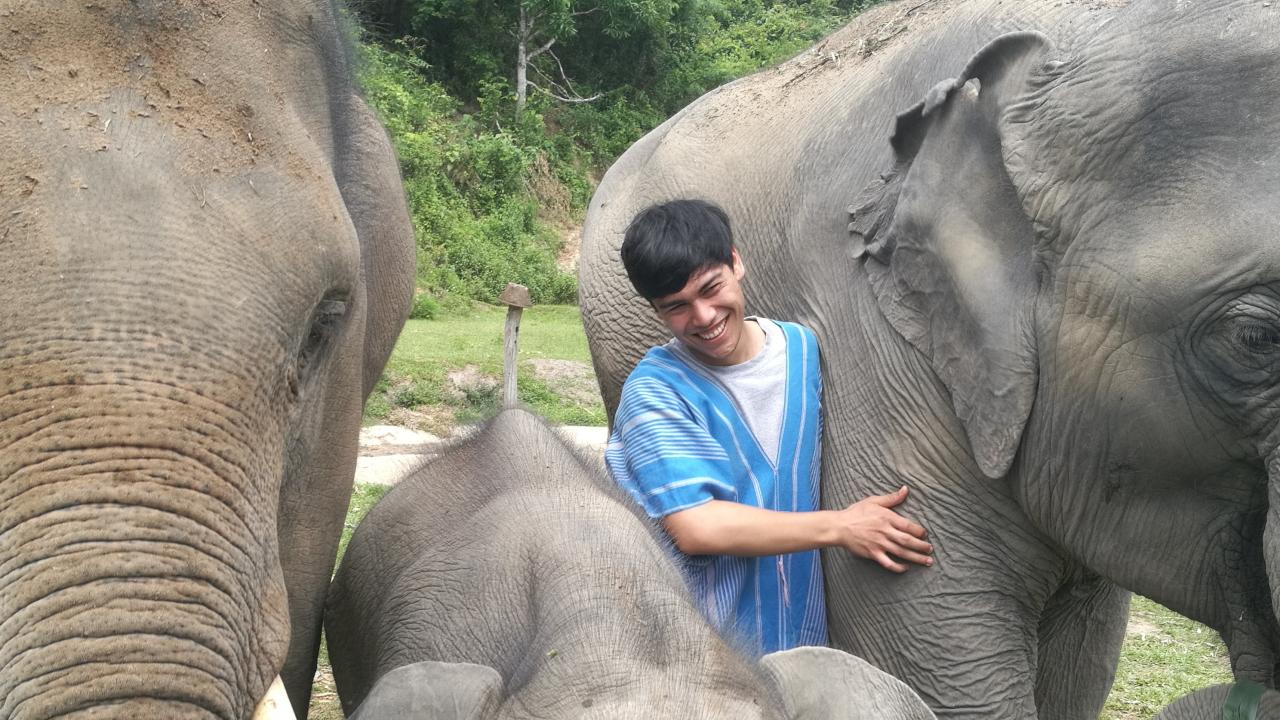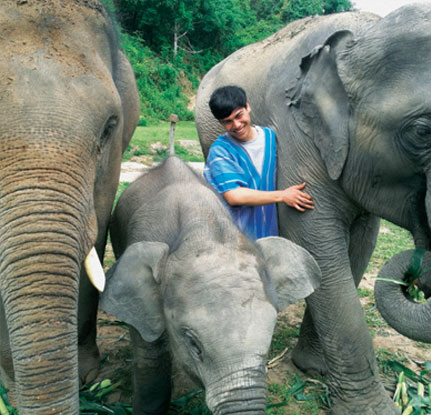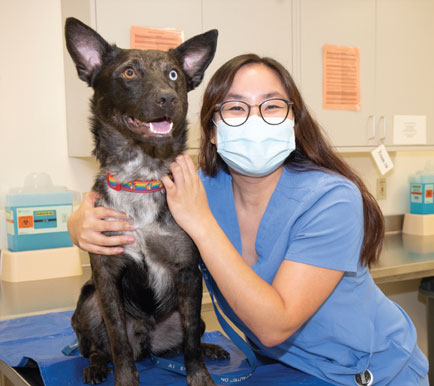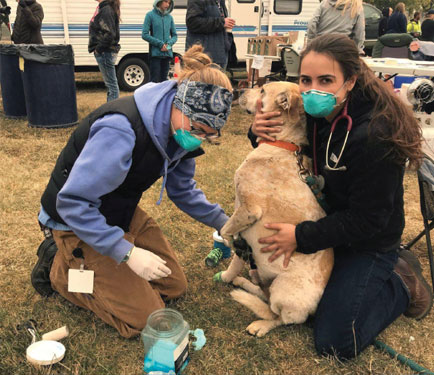
Beyond the Classroom
Hands-on Experience Expands Veterinary Training
Students pursuing a DVM at UC Davis are certainly in the right place to receive a top-notch education, and many say their experiences outside the classroom have had a tremendous impact on their future career paths. Davis students have a variety of opportunities through student-led clubs, internships, and externships that provide hands-on experience that further enrich their training.
Some find a passion in helping neonatal kittens through the Orphan Kitten Project, or helping care for shelter dogs that have come into the Fracture Program Club. Others take leadership roles in coordinating student teams during wildfires with the Veterinary Emergency Response Team, or conducting research through the support of Global Programs internships that will have an impact on wildlife health in the field.
In talking to several students who have immersed themselves in various clubs and programs, one thing is clear. The sky is the limit when it comes to getting involved in these extracurricular activities and the experience they’ve gained in return. In some cases, the opportunities have changed their direction and opened new doors to exciting careers in veterinary medicine. Here are a few of their stories:

Tanner Talan, Class of 2023
Tanner Talan had never touched an elephant before embarking on a Global Programs trip to Thailand to conduct research after his first year of veterinary school. Now, they are one of his favorite animals, and he recently dedicated a year of coursework and research into elephant herpes virus (EEHV) for his Master of Preventive Veterinary Medicine (MPVM) degree.
EEHV can cause a highly fatal hemorrhagic disease when transmitted to juvenile Asian elephants. The disease can be treated with the rapid application of antiviral drugs but has only been effective in around a third of cases.
Early detection in zoo animals and wild populations is critical to managing the disease, so Talan has been testing the sensitivity of non-invasive EEHV sampling methods by comparing fecal and saliva samples to whole blood. Successful non-invasive sampling will add an alternative strategy to more risky and training-intensive blood and trunk wash sampling.
"I’ve always had a strong interest in conservation and ecology," Talan said. “My research experiences through Global Programs and the Students Training in Advanced Research program have shown me the critical role of veterinarians in conservation."
Coming into veterinary school, Talan knew he wanted to focus his career more in the area of research, and his experiences outside the classroom are enabling him to do that. After completing his first two years of DVM training, Talan took a year to conduct research and work toward the MPVM degree as a dual degree DVM/MPVM student. He stepped back into the DVM curriculum this fall and will be continuing his work to prepare his findings to be presented before finishing his veterinary curriculum.
While he had wanted to conduct research in Myanmar, COVID restrictions prevented him from traveling. For this reason, Talan connected with a team from the Houston Zoo to utilize their surveillance samples to conduct a non-invasive sampling study here at UC Davis.
This type of sampling is important to both zoos and reserve populations, Talan explained. While zoos may have the resources to conduct traditional testing, blood and trunk sampling can be dangerous without protective measures and even more so when dealing with wild elephants. Collecting fecal samples is also much easier on patients than collecting blood samples.
“Being able to use non-invasive sampling on these groups opens the possibility of working at population health levels,” he said. “The earlier you can detect EEHV, the earlier you can treat.” Getting involved in various clubs and programs is the best way to learn something new and do a lot of cool things in the process, Talan said.
“Being able to have these research experiences has been invaluable because it has given me a great deal of hands-on experience,” he said. “I’ve learned a lot more about population health, and being involved with various clubs and experiences has shown me all the things a veterinarian can do – it’s such a diverse field. The DVM is a stepping stone along that path.”

Ariana Dubelko, Class of 2022 - Orphan Kitten Project
Kitten season is always busy for DVM students involved in the Orphan Kitten Project, but during the first year of the pandemic, Ariana Dubelko said the fur hit the fan. Her kitchen became a makeshift ICU with incubators on the counters and her garage served as a “grand central station” for supplies because they had to move them off-campus due to COVID restrictions. “We were like kitty drug dealers,” Dubelko said. “I was putting the milk powder and syringes out for kitty fosters/coordinators to pick up, so random people would come to wait outside the house for me to put baggies of milk powder, syringes, vaccine vials, etc outside for them. I had some explaining to do to the neighbors!”
Run by students at the school, the non-profit foster-based rescue program takes in abandoned and neonatal kittens from the community and gives them complete physical exams. These kittens are then fostered by a community of volunteers who bottle-raise them in their own homes. Current DVM students serve as coordinators. The kittens are weaned, vaccinated, FeLV tested, spayed or neutered, and dewormed before they are put up for adoption, usually by 10–12 weeks of age. In a normal year, about 250 kittens come through the program. With shelters suddenly closed, OKP took in double that number from the previous year.
"We had to develop new protocols for vaccinations and exams and often did them in cars instead of people’s homes,” Dubelko said. “We really learned how to shoot from the hip and stay calm in emergencies. It was a crazy time, but cool too.”
Thankfully, with many people stuck at home, there were a lot of helping hands eager to get involved. Dubelko had space in her house, so she took in the sickest neonatal kittens that needed incubators for extra warmth. She rotated them out to fosters as soon as they were stable because new ones just kept coming.
During this time, Dr. Karen Vernau – one of the OKP faculty advisors – asked Dubelko to work on a clinical trial investigating the use of an anti-viral drug in reducing the duration and severity of herpes-induced ocular disease. Dubelko also assisted in a study looking at the use of probiotics to reduce diarrhea in weaning kittens. Through those experiences, she got to go into the hospital frequently, which gave her many opportunities to interact with faculty clinicians and staff. It also sparked her interest in research and prepared her to jump into fourth-year clinic rotations.
"Now that I’m on clinics, I realize how valuable that hands-on experience was," Dubelko said. "I had already learned vaccine protocols, and how to handle infectious diseases like ringworm and panleukopenia."
Serving as one of four co-presidents of OKP during her third year also taught Dubelko the nuts and bolts of running a non-profit – applying for grants, managing a team of coordinators, organizing supplies, providing training for vet students and putting on adoption events.
“Anyone who has touched a neonatal kitten in Yolo County probably has my phone number,” Dubelko said. “It was such a fun experience working with some of my best friends with baby kittens all day. And there were a lot of cool opportunities that arose from being involved. I’ve gotten so much research experience and gained connections to people throughout the community.”

Bella Pendergast, Class of 2023 - Fracture Program Club
When Joey, a 1-year-old border collie mix, was brought to the hospital from a rescue, he needed more care than most rescues could ever provide (video of Joey's story). He had suffered abuse that led to major damage of his rear legs – one was partially amputated with an open wound, and the other had an infected open tibia fracture. He would require external skeletal fixators to help heal the fracture and daily bandage changes for the open wounds.
That’s where Bella Pendergast and other students in the Fracture Program Club came to the rescue. The group of 40-50 students foster rescue animals that receive care through the Orthopedic Surgery Service at the veterinary hospital. Comprised mostly of first- through third-year students, the club gives them hands-on clinical experience before they begin their all-clinical fourth and final year of school.
Joey presented more of a challenge than most cases, but he also helped create a subset of the Fracture Program Club known as the Bandage Team. Since his wound recovery would require several months of care, orthopedic surgeon Amy Kapatkin taught a group of students how to properly care for the wounds and perform bandage changes so Joey could remain at home.
“It was stressful for both the foster and Joey to go to the hospital every day,” said Pendergast. “He was not a typical patient. His open wounds required such intense bandage care.”
She has been involved in the Fracture Program Club since starting veterinary school and feels that it is giving her a more well-rounded education.
I aspire to be an equine veterinarian, and the club gives me more small animal experience than I normally would get with an equine track. - Bella Pendergast
“It’s definitely opened my mind to different options with my career. It’s great to see how this program has allowed so many students to see how easy and fun it is to involve philanthropic aspects to their work and give back.”
In addition to serving as the club’s foster coordinator and social media manager, Pendergast feels this experience with clinical care will help not only with being more comfortable on clinical rotations later, but also in communicating with faculty.
Thanks to Pendergast and several other students, Joey is now doing well. His fracture and infection have healed, and he is transitioning to the use of an orthotic for his partially amputated leg.
“Joey’s infection and injury was so severe, that we weren’t sure if either leg could be saved,” said Dr. Karen Vernau, faculty advisor for the Fracture Program Club. “But, with the dedication of the orthopedic team and the students, Joey is now running off into the sunset with all four legs!”

Jennie Furth-Jacobus, Class of 2024
Jennie Furth-Jacobus has been involved in fostering animals since her undergraduate years, and in her first two years of veterinary school she has already fostered two dogs in the Fracture Program Club and several cats in the Orphan Kitten Project.
She is currently caring for Peaches, a 7-year-old male Chihuahua, following surgery that required bone plates and screws to correct his two fractured femurs.
“Jennie enjoys taking on the more serious cases,” said Vernau. “Beyond his broken legs, Peaches has several other issues that require Jennie to bring him to many appointments. She goes above and beyond to be involved in her fosters’ care at the hospital.”
Furth-Jacobus is a hands-on learner who sees the clubs as a great way to add real-life experience to what she learns in lectures. Her extensive fostering experience has allowed her to take on other responsibilities caring for rescues being seen by the Neurology/Neurosurgery Service.
“Two of my current fosters have idiopathic epilepsy,” said Furth-Jacobus. “It’s been tremendously beneficial learning about seizures and how to manage them. Plus, I’m able to work with multiple services and interact with many faculty members.”
Furth-Jacobus became the surgery coordinator for the Orphan Kitten Project and the foster coordinator-elect for Fracture Program Club – both in her first year of veterinary school. She plans to continue in those roles until the end of her third year in 2023.
The more involved I become with these programs, the more opportunities I’ll have to learn from our faculty and better understand how the hospital operates before I begin my clinical year.
- Jennie Furth-Jacobus
She hopes to pursue a career in veterinary forensics, in which she already holds a graduate certificate, as well as emergency and critical care. She is the proud owner of “One-Eyed” Winnie, a 12-year-old Chihuahua “foster fail” whom she adopted after fostering through her undergraduate experience with the Vet Aide Club.

Katie McFarren, Class of 2022
Katie McFarren is no stranger to dealing with emergencies. She worked as an EMT during college. But she found a new way to immerse herself into the skills needed for disaster response through the student Veterinary Emergency Response Team (sVERT).
McFarren always knew she wanted to be involved in a medical field, but wasn’t sure that path would be in veterinary medicine until she took a trip to Ecuador after undergraduate school. While there, she worked for six weeks with an NGO on sustainable grazing and farming, spending free time with a local veterinarian working with parasite management in cattle and goats, and milk quality management at dairies.
During her first year in veterinary school, McFarren got the opportunity to jump into the deep end of disaster response during the Camp Fire of 2018.
“School was cancelled due to the smoke,” McFarren said. “which meant that I had time to volunteer, so I went out a lot. There are so many ways to help during these disasters.”
McFarren grew up around horses in Nevada and worked with pack mules, so she already had confidence and calm while working around horses. The team was later assigned to work at the large animal evacuation site at the Gridley fairgrounds under the direction of local veterinarians.
“They put us to work helping with meds, wrapping legs, triaging animals coming in and making up treatment lists for the next day,” she said. “The work is challenging, but the clearer and simpler the directions are, the better. The more you do it, the better you get at it.”
McFarren and others on the team have responded to several devastating fire seasons during her time at the school. Through those deployments, she had the chance to work with several mentors – Drs. John Madigan, Lais Costa and Eric Davis.
“It has been amazing to go out and learn from different people. They truly help you grow, stay motivated, and teach with their experience, which is invaluable. You learn how to be part of the solution, not part of the chaos. - Katie McFarren
McFarren said she has seen a lot of change in the program over the past four years and it’s been rewarding to see it grow.
“We’ve been able to make an impact and help others when they need to take a break,” she said. “Teamwork is critical in disaster response.”
McFarren has participated in several other clubs as well. She’s assisted with the Knights Landing One Health Clinic, spay/neuter events, equine medicine, and shelter medicine, as well as serving as co-president of the Food Animal and Reproduction Medicine Club.
She hopes to land in a rural location working in a mixed animal practice after graduation.
“My experiences through UC Davis have set me up well to enter the workforce,” McFarren said. “The training I received through sVERT has been a huge part of that."
